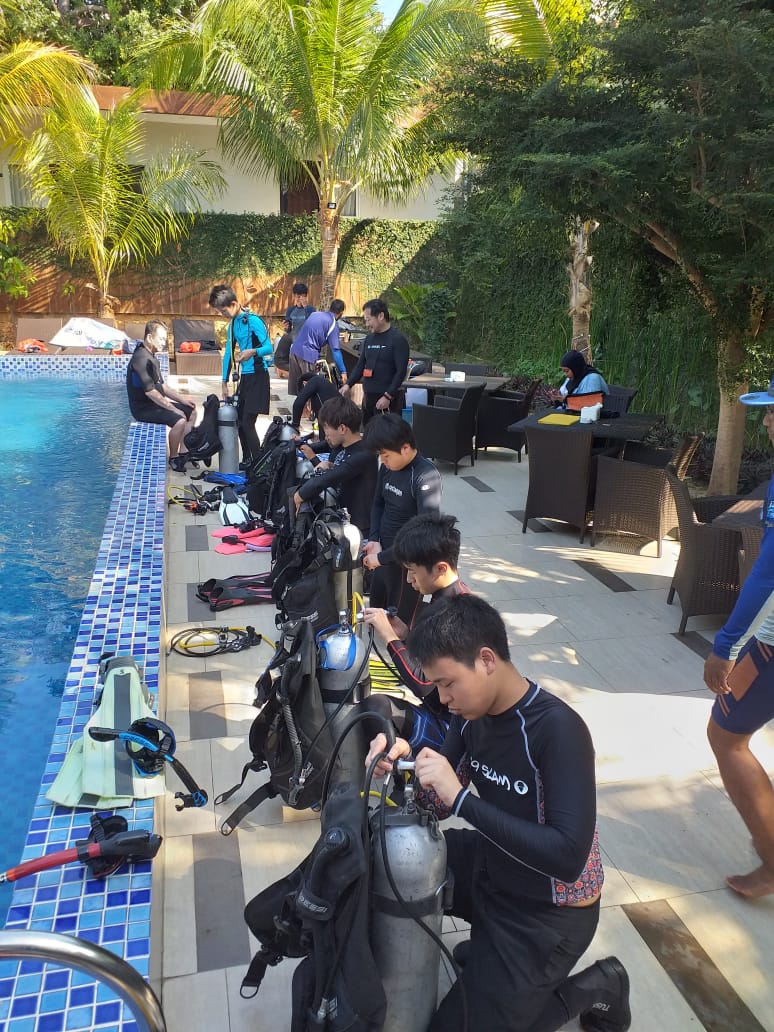
Benefits of Diving Skills and Job Opportunities at the Faculty of Fisheries and Marine Sciences UNDIP
FPIK, SEMARANG – One of the programs owned by the Faculty of Fisheries and Marine Sciences, Diponegoro University (FPIK UNDIP) is a Diving Expertise training and certification program in the Karimunjawa Islands, Jepara. The program which has been running for four years from 2016 to 2019 through collaboration with Kwansei Gakuin University (KGU) Japan is quite attractive to both regular students and foreign students.
“The training program called Introduction to Scientific Diving has been running for 4 years from 2016 to 2019 and was stopped due to the corona virus (Covid-19) pandemic,” explained Dr. Munasik lecturer of Marine Science Study Program FPIK UNDIP in an interview on Saturday (19/6/2021). He added that this training activity is a Summer Lecture, the Summer Course is rewarded with 1-2 Semester Credit Units (SKS).
It was also stated that the learning achievement of this activity was that students were able to dive in SCUBA and were certified as Open Water Divers from the Association of Diving School International ADS-I. In addition, the lecturers also provide lecture materials on tropical marine ecosystems, namely coral reefs, mangroves and seagrasses.
“In addition to providing Scuba Diving Training, we also educate them to care about marine ecosystems, visit coastal ecosystems and small islands and be involved in repairing coral reefs,” he added.
This diving skill prompted FPIK UNDIP students to be asked for assistance by the Central Java SAR team to assist in the search for victims of the sinking of a tourist boat that capsized in Kedung Ombo Reservoir, Boyolali Regency in mid-May. Also several other humanitarian activities related to accidents in the water.

Photo: An FPIK student is doing scuba water entry in Karimunjawa waters, Jepara Regency
FPIK UNDIP has 6 departments, including the Department of Aquaculture, Department of Aquatic Resources, Department of Capture Fisheries, Department of Marine Affairs, Department of Oceanography and Department of Fishery Products Technology. Supported by competent lecturers with qualifications, 55 of them have doctoral degrees, which are strengthened by 19 currently active professors.
FPIK UNDIP alumni have spread all over Indonesia and in various fields, both in government, education, health, TNI, private companies, BUMN and entrepreneurs. Some graduates of FPIK UNDIP who hold strategic positions such as Sakina Roselasari as Head of the Manpower and Transmigration Office of Central Java Province, then Ir. Haris Muhtadi as Marketing Director of Aquafeed and Chairman of GPMT, plus A. Karding as a politician, Benaya Semeon is active in the Wildlife Conservation Society (WCS), Widhya Nugroho Satrioajie, S.Pi., M.Si. as Young Expert Researcher at the Biological Research Center at Cibinong Science Center LIPI, Herda Bolly as Quality Control at a Dutch foreign food company, Kharisma R. Dahono as Manager of Bank Mandiri, and Sudiarso as entrepreneur at PT Kurinia Mitra Makmur.
“This shows that FPIK UNDIP graduates have the opportunity to work in various fields,” said the Dean of FPIK UNDIP Prof. Ir. Tri Winarni Agustini, M.Sc., Ph.D in a separate interview on Sunday (20/6/2021). More Prof. Tri Winarni said that students did not only learn related to science, but were also given material related to management and business. “So that FPIK UNDIP graduates are not limited to diving into the waters, but are able to surf to various worlds of work and have many opportunities including being researchers, educators, aquaculture developers, consultants, conservation experts, aquaculture instructors, managers, entrepreneurs to members of parliament,” she concluded. (Utami | Tim Humas UNDIP)
























